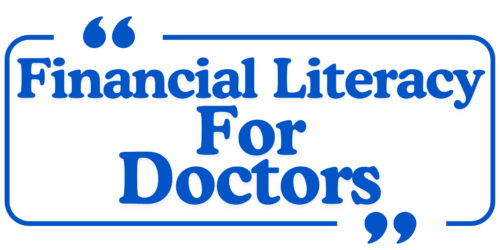Why Doctors Need Financial Literacy
Doctors are widely respected for their expertise in medicine, but many find themselves unprepared when it comes to managing their finances. Years of education and training focus on medical science and patient care, leaving little room for financial literacy. However, mastering financial literacy is crucial for doctors, not only to ensure personal financial well-being but also to navigate the complexities of the healthcare industry, private practice management, and long-term wealth preservation.
Here are some compelling reasons why financial literacy is essential for doctors.
1. High Income, High Debt
One of the key challenges for doctors is the significant student debt accumulated during medical school and residency. According to the Association of American Medical Colleges, the average medical student graduates with around $200,000 in debt. Even though doctors typically earn a higher-than-average income, managing and repaying this debt while balancing other financial obligations can be overwhelming without a solid understanding of personal finance.
Financial literacy empowers doctors to create a comprehensive plan for debt repayment, manage high-interest loans, and avoid falling into a cycle of financial stress. By mastering budgeting, cash flow management, and understanding loan terms, doctors can accelerate their debt repayment and begin building wealth more effectively.
2. Investment Planning
Doctors often have high earning potential, which presents opportunities for investment. However, without a clear understanding of the investment landscape, physicians may miss out on long-term wealth-building strategies. Financial literacy helps doctors make informed decisions about retirement accounts, real estate, stocks, and other investment opportunities that can provide passive income.
Having a solid investment plan can also help doctors navigate their income fluctuations, especially those in private practice or who rely on variable bonuses. A well-diversified investment portfolio tailored to a doctor’s risk tolerance and time horizon can ensure long-term financial security, even during economic downturns.
3. Tax Optimization
Tax planning is another area where financial literacy is essential for doctors. Due to their higher income levels, physicians can face substantial tax burdens. With the proper financial knowledge, doctors can explore tax-saving strategies, such as maximizing contributions to tax-advantaged accounts (like 401(k)s and IRAs), utilizing tax credits, and exploring deductions related to medical practice expenses.
Understanding the tax code allows doctors to reduce their taxable income, ensuring they retain more of their hard-earned money. Financial literacy can also help doctors work with tax professionals to create a customized tax strategy that aligns with their specific situation.
4. Private Practice Management
For doctors who run or are part of a private practice, financial literacy extends beyond personal finance to business management. Physicians must understand the financial aspects of running a practice, including revenue cycle management, operating costs, and payroll. Without a strong grasp of these elements, a practice can quickly become financially unstable.
Financial literacy allows doctors to better understand profit margins, assess financial risks, and make informed decisions about hiring, technology investments, and practice growth. It also aids in negotiating contracts with insurance providers and vendors, ensuring the practice remains profitable.
5. Planning for Retirement
Finally, doctors need financial literacy to plan effectively for retirement. Many physicians are so focused on their demanding careers that they overlook the importance of long-term retirement planning. Starting early, understanding compound interest, and making wise investment decisions can make a significant difference in retirement readiness.
Doctors also face unique challenges in retirement planning due to factors like delayed entry into the workforce and higher-than-average retirement savings needs. Financial literacy helps them understand the nuances of retirement planning, including healthcare costs, insurance, and creating a retirement income strategy that lasts through their golden years.
In conclusion, financial literacy is essential for doctors, not just for managing their personal finances but also for navigating the financial complexities of their careers. By gaining financial knowledge, doctors can secure their financial futures, reduce stress, and focus on what they do best—caring for patients.
Written by Pat Brown, MBA
